

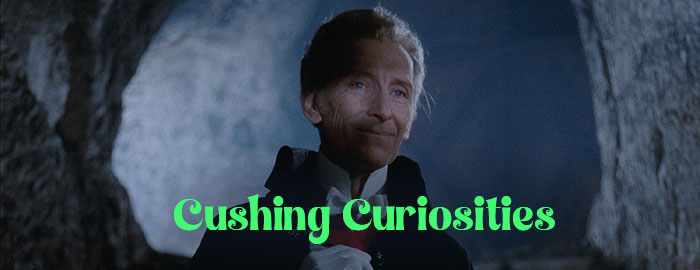
CONE OF SILENCE
B&W, 1960,
91 mins. 49 secs.
Directed by Charles Frend
Starring Michael Craig, Peter Cushing, Bernard Lee, George Sanders, Elizabeth Seal, André Morell
Severin Films (Blu-ray) (US R0 HD), Oden (DVD (UK R2 PAL), VCI (DVD) (US R1 NTSC) / WS (2.35:1) (16:9)
SUSPECT
B&W, 1960, 81 mins. 28 secs.
Directed by Roy and John Boulting
Starring Tony Britton, VIrginia Maskell, Peter Cushing, Donald Pleasence, Ian Bannen, Thorley Walters, Spike Milligan
Severin Films (Blu-ray) (US RA HD), Network Releasing (Blu-ray) (UK RB HD) / WS (1.66:1) (16:9)
THE MAN WHO FINALLY DIED
B&W, 1962, 100 mins. 19 secs.
Directed by Quentin Lawrence
Starring Peter Cushing, Stanley Baker, Mai Zetterling, Nigel Green
Severin Films (Blu-ray) (US RA HD), Network Releasing (Blu-ray) (UK RB HD) / WS (2.35:1) (16:9)
SHERLOCK HOLMES
Color, 1968, 308 mins.
Directed by
Starring Peter Cushing, Nigel Stock, Madge Ryan, Ann Bell, Nick Tate, Gary Raymond
Severin Films (Blu-ray) (US RA HD), A&E (DVD) (US R1 NTSC)
BLOODSUCKERS
Color, 1971, 86 mins. 27 secs. / 82 mins. 50 secs.
Directed by Robert Hartford-Davis
Starring Peter Cushing, Patrick Macnee, Patrick Mower, Alex Davion, Edward Woodward, Johnny Sekka, Madeleine Hinde
Severin Films (Blu-ray) (US R0 HD), ESC (Blu-ray) (France R0 HD) / WS (1.66:1) (16:9), Something Weird / Image Entertainment (DVD) (US R1 NTSC)
TENDER DRACULA
Color, 1974, 89 mins. 32 secs.
Directed by Pierre Grunstein
Starring Peter Cushing, Alida Valli, Bernard Menez, Miou-Miou, Nathalie Courval, Stéphane Shandor
Severin Films (Blu-ray) (US RA HD) / WS (1.66:1) (16:9)
 dual boxes devoted the Continental European output of Christopher Lee,
dual boxes devoted the Continental European output of Christopher Lee, 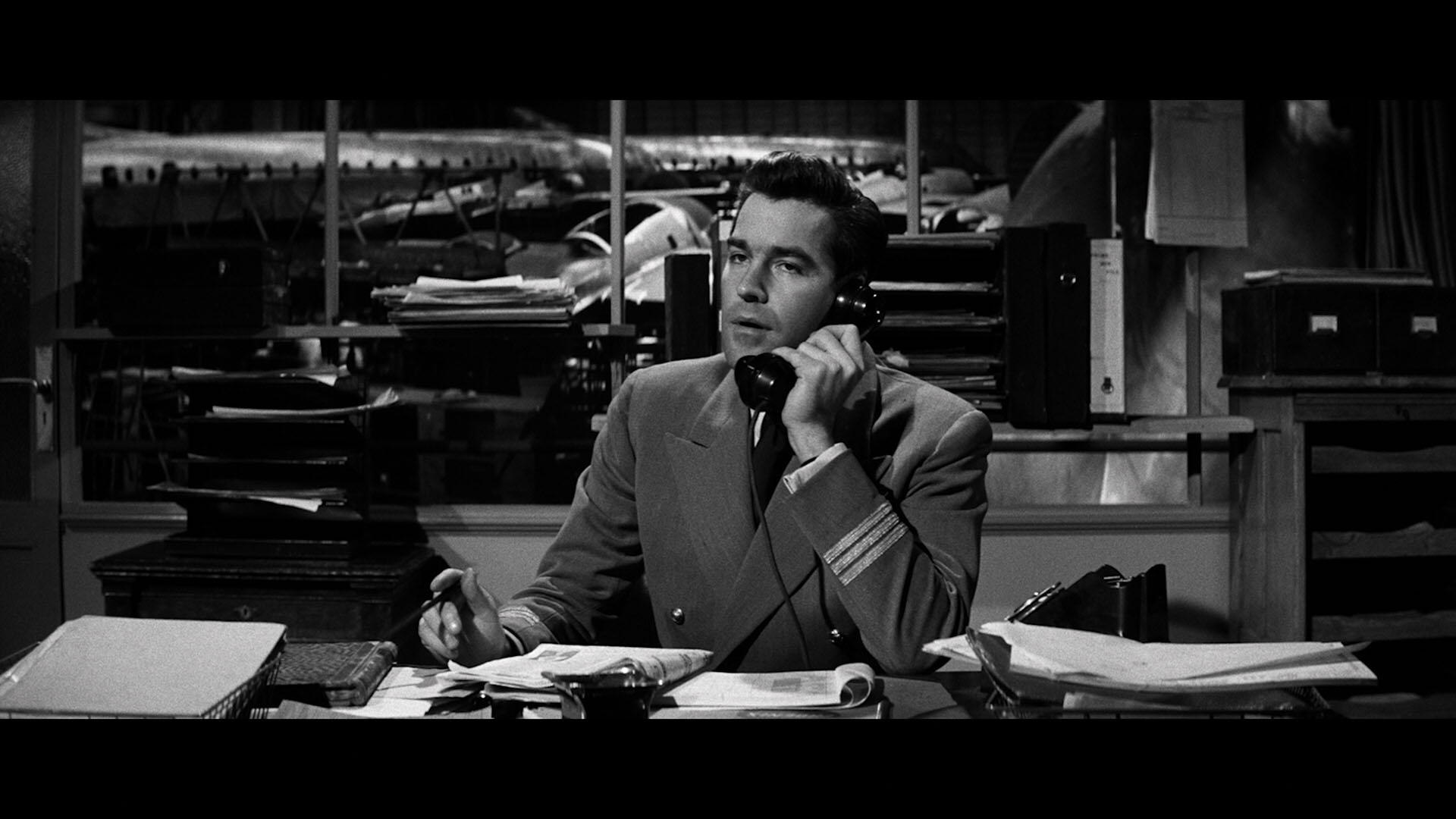 Severin Films turned its attentions to his frequent fellow star (in Hammer productions and otherwise), Peter Cushing, for a 2023 Blu-ray set entitled Cushing Curiosities. Unlike the Lee releases, this one is almost entirely British -- plus a confounding Greek-shot partial U.K. production and the actor's one vampire acting role for a wild French comedy. If you're looking for straight-up horror, you've definitely come to the wrong place; however, if you're a Cushing fan this is a welcome treasure chest of genre-spanning roles both leading and supporting collected from a rich, 13-year period, and each one has been thankfully rescued from falling between the cracks. The set is also highly recommended for the inclusion of the superb new 200-page book by Jonathan Rigby, Peter Cushing: A Portrait in Six Sketches, which delivers an insightful look at the actor's life and work by honing in on specific transitional periods that made him the legendary name he is today.
Severin Films turned its attentions to his frequent fellow star (in Hammer productions and otherwise), Peter Cushing, for a 2023 Blu-ray set entitled Cushing Curiosities. Unlike the Lee releases, this one is almost entirely British -- plus a confounding Greek-shot partial U.K. production and the actor's one vampire acting role for a wild French comedy. If you're looking for straight-up horror, you've definitely come to the wrong place; however, if you're a Cushing fan this is a welcome treasure chest of genre-spanning roles both leading and supporting collected from a rich, 13-year period, and each one has been thankfully rescued from falling between the cracks. The set is also highly recommended for the inclusion of the superb new 200-page book by Jonathan Rigby, Peter Cushing: A Portrait in Six Sketches, which delivers an insightful look at the actor's life and work by honing in on specific transitional periods that made him the legendary name he is today. Elizabeth (Seal) believe her father is blameless and also strikes up a potential romance with Dallas. More intrigue ensues during Gort's next flight with the shifty Captain Clive Judd (Cushing), with an errant chunk of hedge in the wheels seemingly at fault for another airline incident and further investigation raising more
Elizabeth (Seal) believe her father is blameless and also strikes up a potential romance with Dallas. More intrigue ensues during Gort's next flight with the shifty Captain Clive Judd (Cushing), with an errant chunk of hedge in the wheels seemingly at fault for another airline incident and further investigation raising more 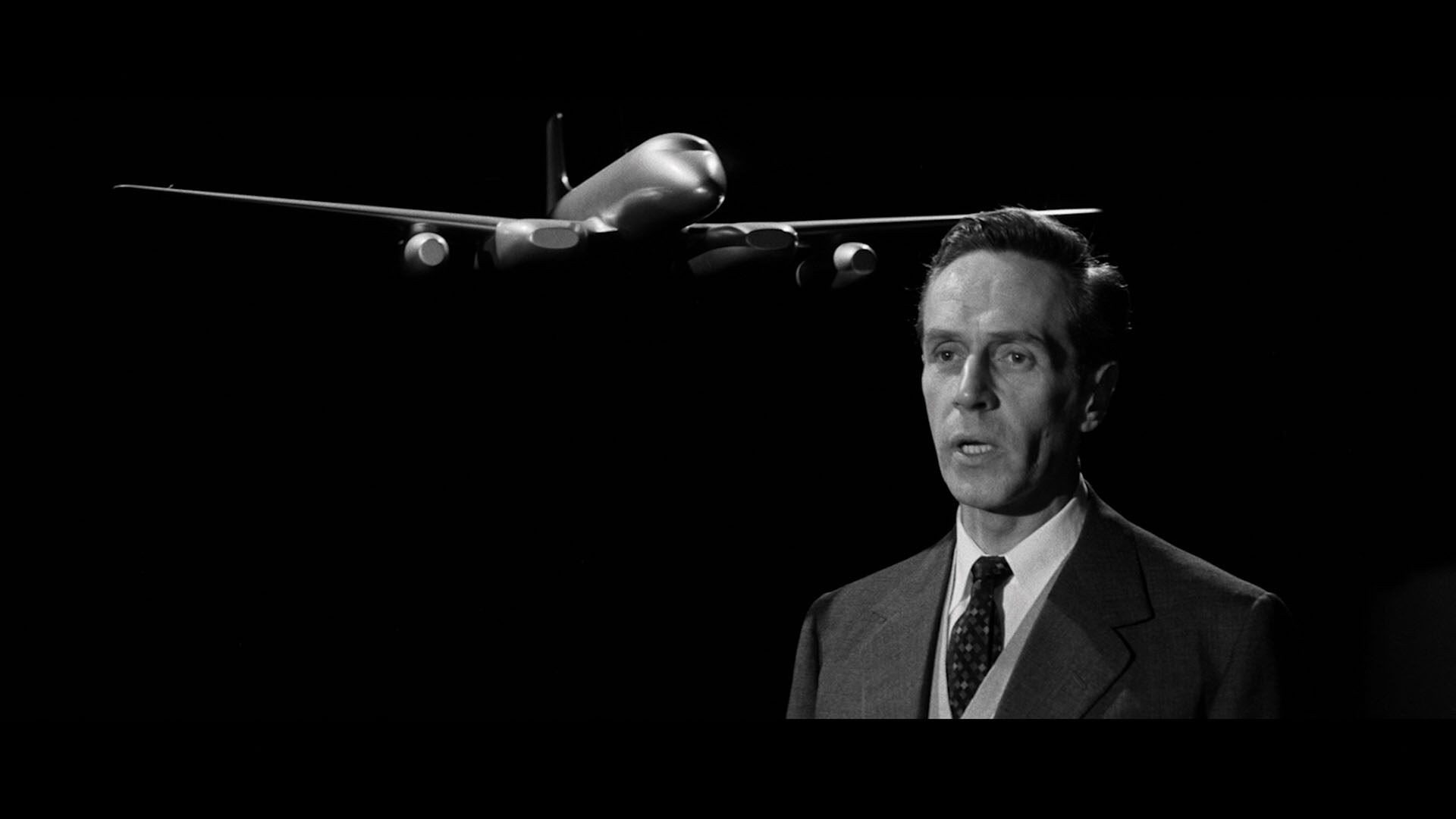 questions about what could really be at fault.
questions about what could really be at fault. 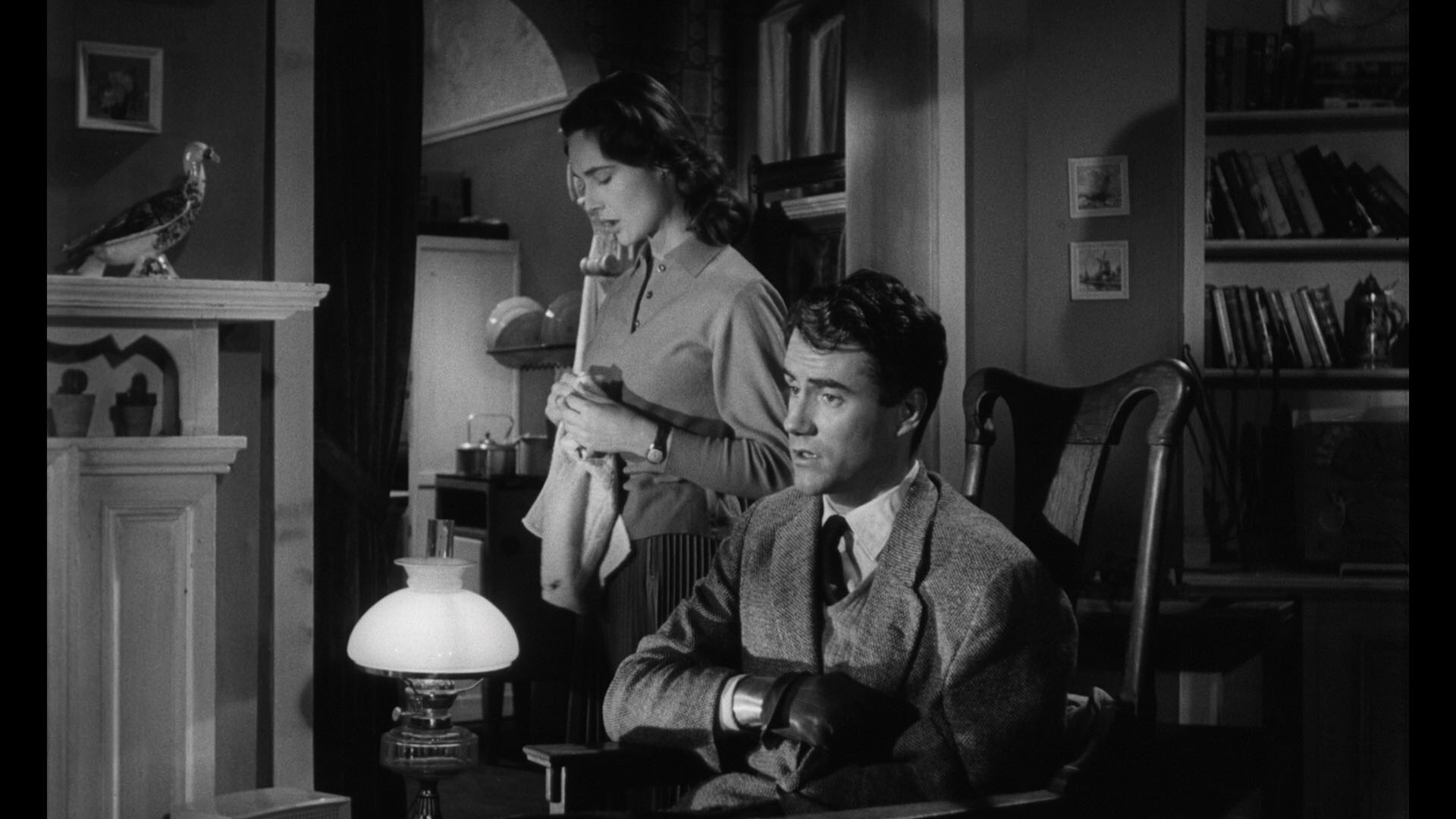 Dalton (63m46s)
Dalton (63m46s)  about virtually his entire life from his upbringing onward; and a 1973 interview (12m55s) about his residence in Whitstable (accompanied by modern footage of the neighborhood) and his memories of his wife, Helen, who had passed away to years earlier.
about virtually his entire life from his upbringing onward; and a 1973 interview (12m55s) about his residence in Whitstable (accompanied by modern footage of the neighborhood) and his memories of his wife, Helen, who had passed away to years earlier. as a very obvious Soviet spy,
as a very obvious Soviet spy,  Thorley Walters, and Spike Milligan as the comic relief office cleaner.
Thorley Walters, and Spike Milligan as the comic relief office cleaner.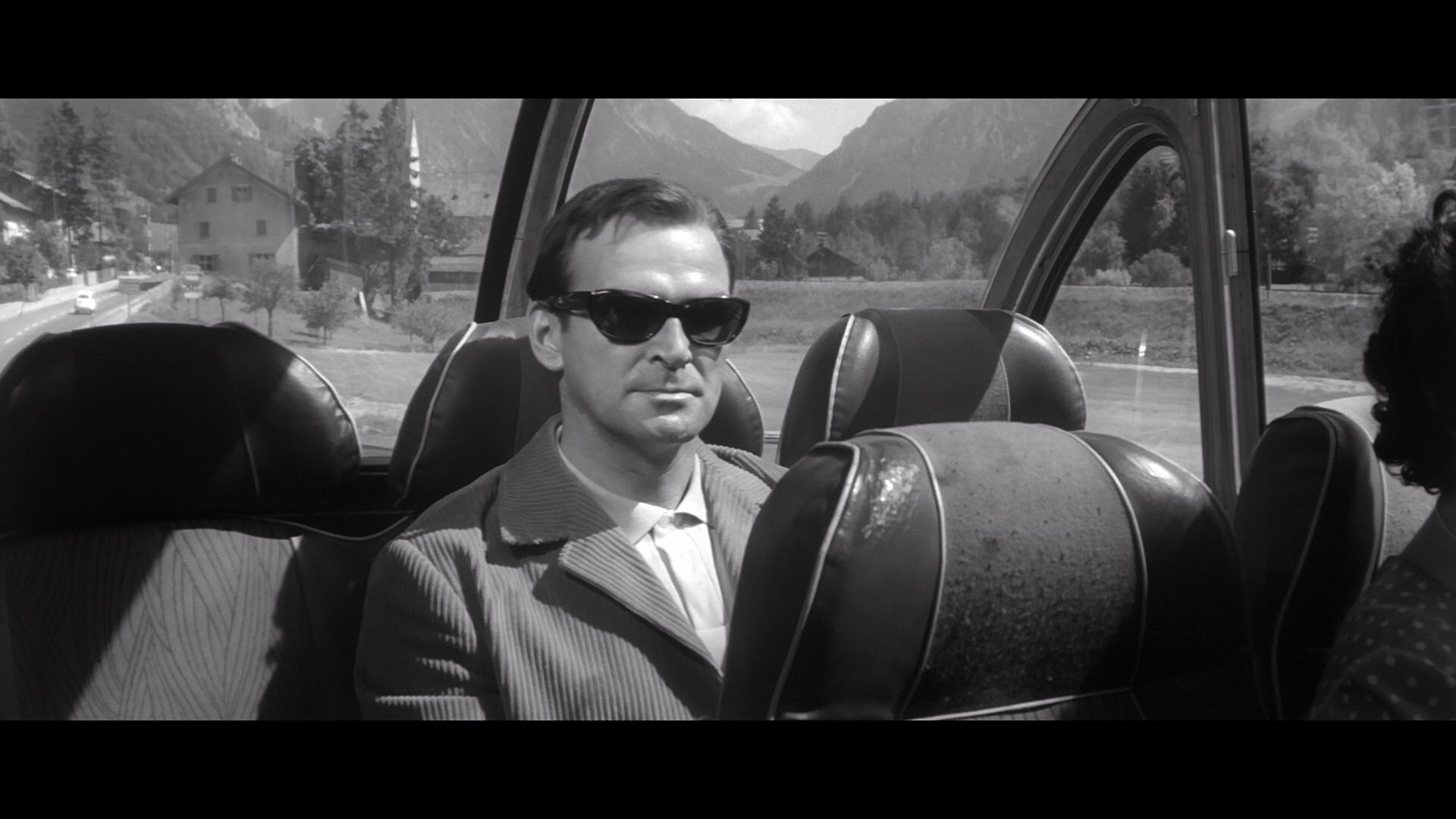 most
most  viewers.
viewers.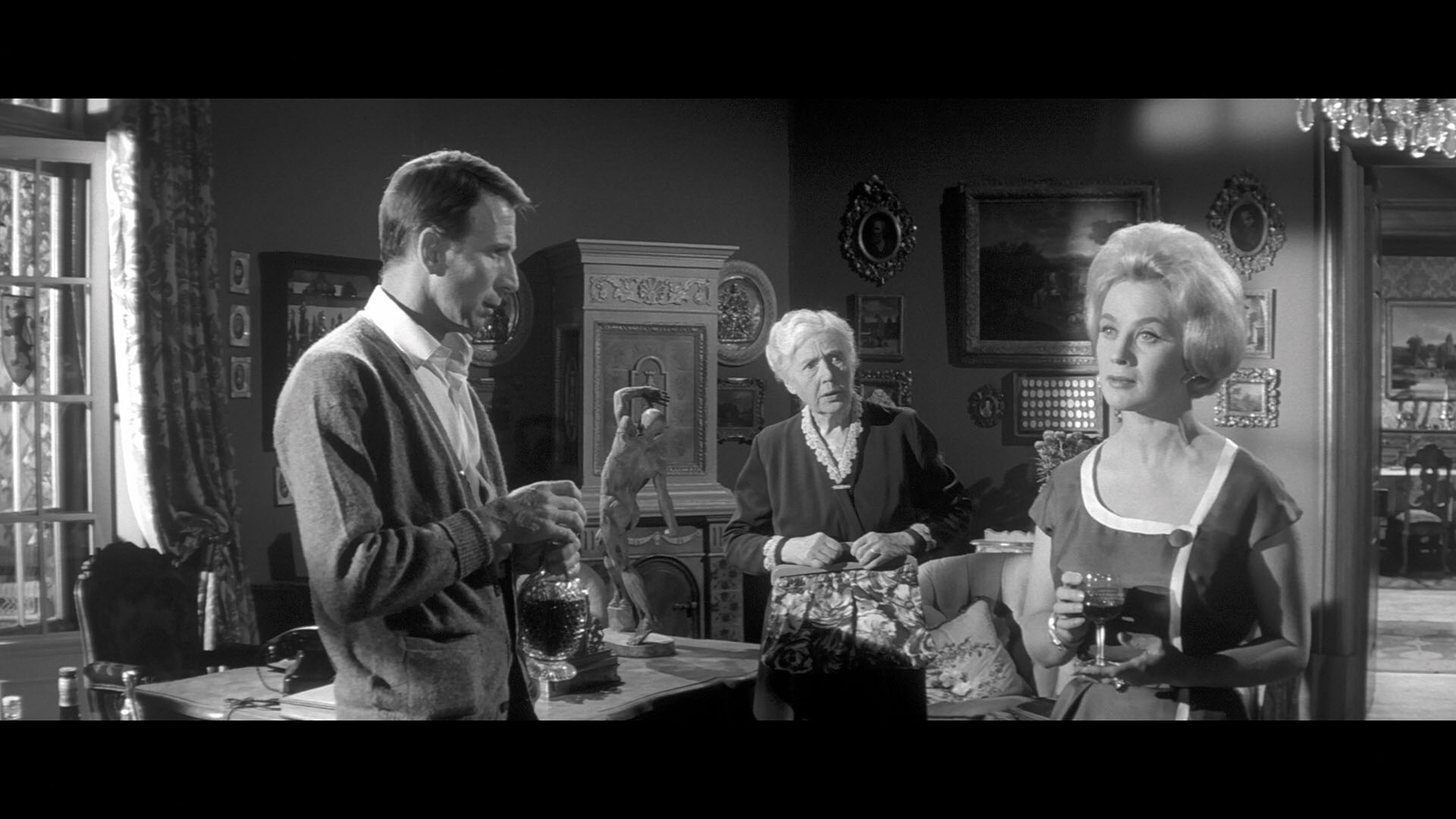 Niall MacGinnis who gets to do a nod of sorts to his big send-off
Niall MacGinnis who gets to do a nod of sorts to his big send-off  from Night of the Demon. Virtually everything written about this film compares it to The Third Man, unavoidably so given the nature of the plot and the not dissimilar harpsichord-crazy score, though the fact that this is further removed from the end of World War II gives it a far less intense and sinister edge. Luckily you have that cast on board to carry you through, and any chance to see Baker and Green sharing the frame together is automatically worth a look. Again this one has been around in a nice HD scan from Studiocanal in the U.K., but the Severin Blu-ray (which looks identical and is gorgeous) beefs it up with a great audio commentary by Kim Newman and Barry Forshaw who really dig into the backgrounds of the director and cast, the film's critical reception, the trend of turning British TV projects into features, and much more.
from Night of the Demon. Virtually everything written about this film compares it to The Third Man, unavoidably so given the nature of the plot and the not dissimilar harpsichord-crazy score, though the fact that this is further removed from the end of World War II gives it a far less intense and sinister edge. Luckily you have that cast on board to carry you through, and any chance to see Baker and Green sharing the frame together is automatically worth a look. Again this one has been around in a nice HD scan from Studiocanal in the U.K., but the Severin Blu-ray (which looks identical and is gorgeous) beefs it up with a great audio commentary by Kim Newman and Barry Forshaw who really dig into the backgrounds of the director and cast, the film's critical reception, the trend of turning British TV projects into features, and much more. breakneck schedule), only a handful survive intact and have been issued on DVD in the U.K. by the BBC and the U.S. by A&E. Here in the Blu-ray set we get the
breakneck schedule), only a handful survive intact and have been issued on DVD in the U.K. by the BBC and the U.S. by A&E. Here in the Blu-ray set we get the  shows looking as good as they could given the fact that they were shot on tape and come from the only surviving masters, while extracts of otherwise lost tales are also included. We start off with "episode 1," the earliest surviving of the '68 run and the third one to be aired: A Study in Scarlet (50m26s), in which Holmes and Watson are summoned to an abandoned house where a dead American has been discovered with the word "RACHE" written in blood on the wall. The death by poisoning and a woman's ring lead our heroes on a trail of conspiracy involving an international crime ring. The first written Holmes story, this one has been adapted many times (most definitely in the later TV series with Jeremy Brett) and is still plenty of fun to watch here with Cushing (frequently sporting a top hat and gloves) still in fine form as Holmes almost a decade after his first classic interpretation for Hammer in 1959's The House of the Baskervilles. (Incidentally, a much older Cushing played Holmes again as a one-off production in 1984, The Masks of Death, which was everywhere on VHS back in the day). This episode (which looks nice apart from some occasional rolling tape damage) can be played with an optional 30-second countdown clock and sports a new commentary by Kim Newman and David Stuart Davies, which goes a fine job of untangling the history of this series including its official title and season ranking, the process of licensing Doyle's short stories and novels back then (with anything featuring Moriarty off limits for a while), and the ins and outs of all the participants seen here as well as the narrative traits running throughout this show.
shows looking as good as they could given the fact that they were shot on tape and come from the only surviving masters, while extracts of otherwise lost tales are also included. We start off with "episode 1," the earliest surviving of the '68 run and the third one to be aired: A Study in Scarlet (50m26s), in which Holmes and Watson are summoned to an abandoned house where a dead American has been discovered with the word "RACHE" written in blood on the wall. The death by poisoning and a woman's ring lead our heroes on a trail of conspiracy involving an international crime ring. The first written Holmes story, this one has been adapted many times (most definitely in the later TV series with Jeremy Brett) and is still plenty of fun to watch here with Cushing (frequently sporting a top hat and gloves) still in fine form as Holmes almost a decade after his first classic interpretation for Hammer in 1959's The House of the Baskervilles. (Incidentally, a much older Cushing played Holmes again as a one-off production in 1984, The Masks of Death, which was everywhere on VHS back in the day). This episode (which looks nice apart from some occasional rolling tape damage) can be played with an optional 30-second countdown clock and sports a new commentary by Kim Newman and David Stuart Davies, which goes a fine job of untangling the history of this series including its official title and season ranking, the process of licensing Doyle's short stories and novels back then (with anything featuring Moriarty off limits for a while), and the ins and outs of all the participants seen here as well as the narrative traits running throughout this show. two-episode adaptation of The Hound of the Baskervilles (51m52s and 51m39s), which finds Cushing doing his second go-round at the legendary
two-episode adaptation of The Hound of the Baskervilles (51m52s and 51m39s), which finds Cushing doing his second go-round at the legendary 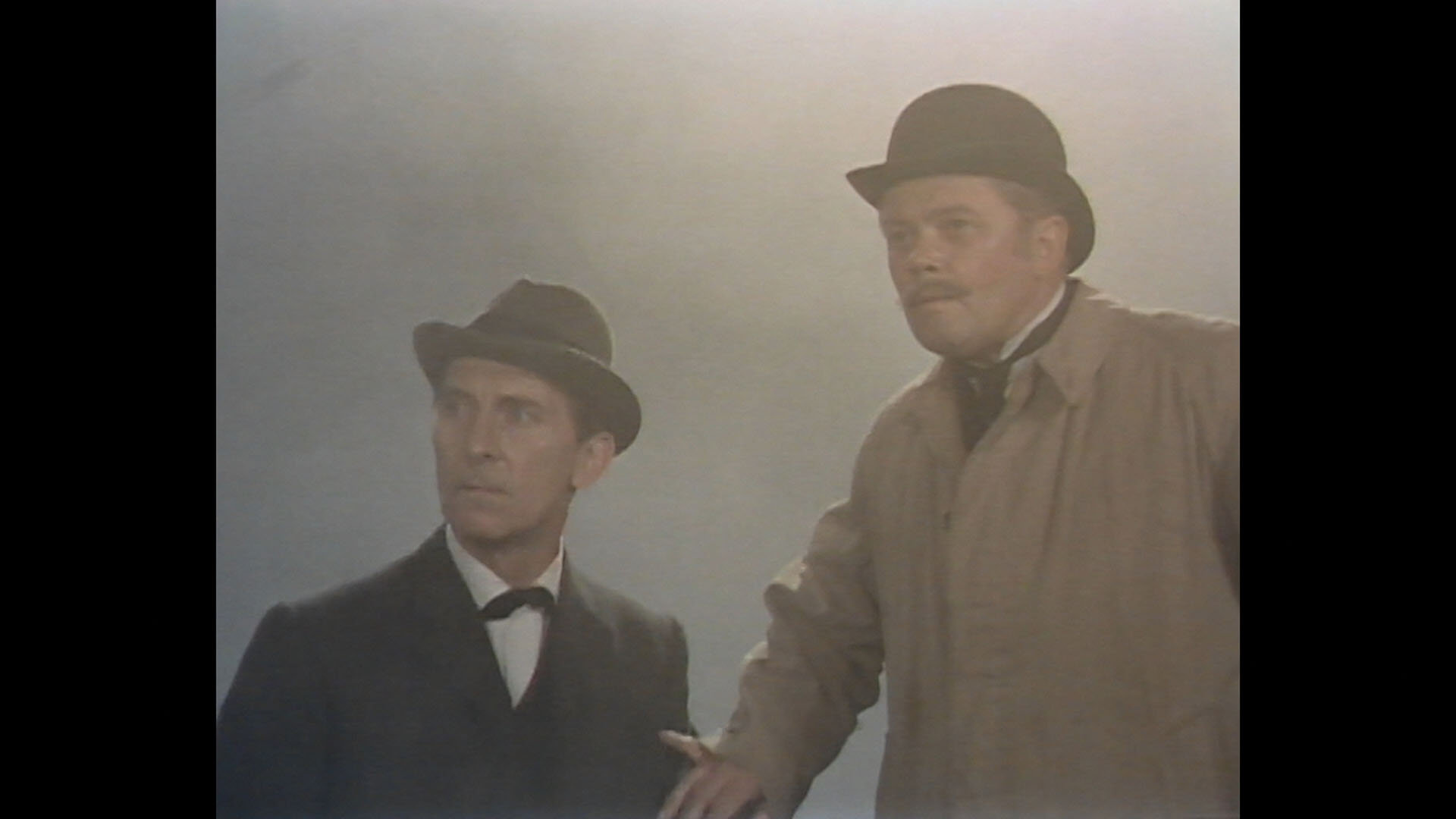 mystery novel with a far more subdued tone than the flamboyant Hammer one. Partially shot on location at Dartmoor, this sticks to the book fairly closely as we get the familiar saga of Sir Henry Baskerville (Gary Raymond from Traitor's Gate and Jason and the Argonauts) and his efforts to avoid his family curse, namely a supernatural hound supposedly haunting the nearby moors with a taste for any of his family members. This time Davies and Barry Forshaw do the honors for commentaries on both episodes (best listened to straight through) as they go through the unique aspects of this take on the material, the shooting locations, the history of the source novel, the inevitable comparisons to other versions, and Cushing's version of Holmes seen here compared to the one before. Disc four houses the remaining three episodes -- The Boscombe Valley Mystery (50m54s), The Sign of Four (52m28s), and The Blue Carbuncle (50m42s) -- with Holmes and Watson tackling a case of possibly staged patricide on a family farm, a string of sinister dart murders committed across London (from the second Holmes novel), and a seemingly stolen gem that poses a Christmastime challenge. The Holmesiana gets thrown around fast and furious in these, including an appearance by the familiar Irene Adler, and while Cushing may have been aggravated by the production at this point, it doesn't really show in his performances here. This time the commentaries shuffle a bit with Newman and Forshaw doing Boscombe, Newman and Davies doing The Sign of Four, and Newman and Forshaw for Carbuncle; these are all up to the same level as they shuffle through the evolution of the series, the lost episodes, Cushing's career in the late '60s and the state of his personal life, and the histories behind the literary sources including their other adaptations and Doyle's own approach to how his material was published (and sometimes retracted for a while). Also here is an illustrated Cushing interview with Davies (18m9s) about the series and Doyle's own perspective on the character, which provides some fascinating insight into how Cushing went about the role and his awareness of preceding versions including the Basil Rathbone movies. Finally Jonathan Rigby and Kevin Lyons present a commentary look at the series' lost segments (8m21s) featuring scraps from six episodes, with "recovered" color here for what was originally aired in black-and-white.
mystery novel with a far more subdued tone than the flamboyant Hammer one. Partially shot on location at Dartmoor, this sticks to the book fairly closely as we get the familiar saga of Sir Henry Baskerville (Gary Raymond from Traitor's Gate and Jason and the Argonauts) and his efforts to avoid his family curse, namely a supernatural hound supposedly haunting the nearby moors with a taste for any of his family members. This time Davies and Barry Forshaw do the honors for commentaries on both episodes (best listened to straight through) as they go through the unique aspects of this take on the material, the shooting locations, the history of the source novel, the inevitable comparisons to other versions, and Cushing's version of Holmes seen here compared to the one before. Disc four houses the remaining three episodes -- The Boscombe Valley Mystery (50m54s), The Sign of Four (52m28s), and The Blue Carbuncle (50m42s) -- with Holmes and Watson tackling a case of possibly staged patricide on a family farm, a string of sinister dart murders committed across London (from the second Holmes novel), and a seemingly stolen gem that poses a Christmastime challenge. The Holmesiana gets thrown around fast and furious in these, including an appearance by the familiar Irene Adler, and while Cushing may have been aggravated by the production at this point, it doesn't really show in his performances here. This time the commentaries shuffle a bit with Newman and Forshaw doing Boscombe, Newman and Davies doing The Sign of Four, and Newman and Forshaw for Carbuncle; these are all up to the same level as they shuffle through the evolution of the series, the lost episodes, Cushing's career in the late '60s and the state of his personal life, and the histories behind the literary sources including their other adaptations and Doyle's own approach to how his material was published (and sometimes retracted for a while). Also here is an illustrated Cushing interview with Davies (18m9s) about the series and Doyle's own perspective on the character, which provides some fascinating insight into how Cushing went about the role and his awareness of preceding versions including the Basil Rathbone movies. Finally Jonathan Rigby and Kevin Lyons present a commentary look at the series' lost segments (8m21s) featuring scraps from six episodes, with "recovered" color here for what was originally aired in black-and-white. 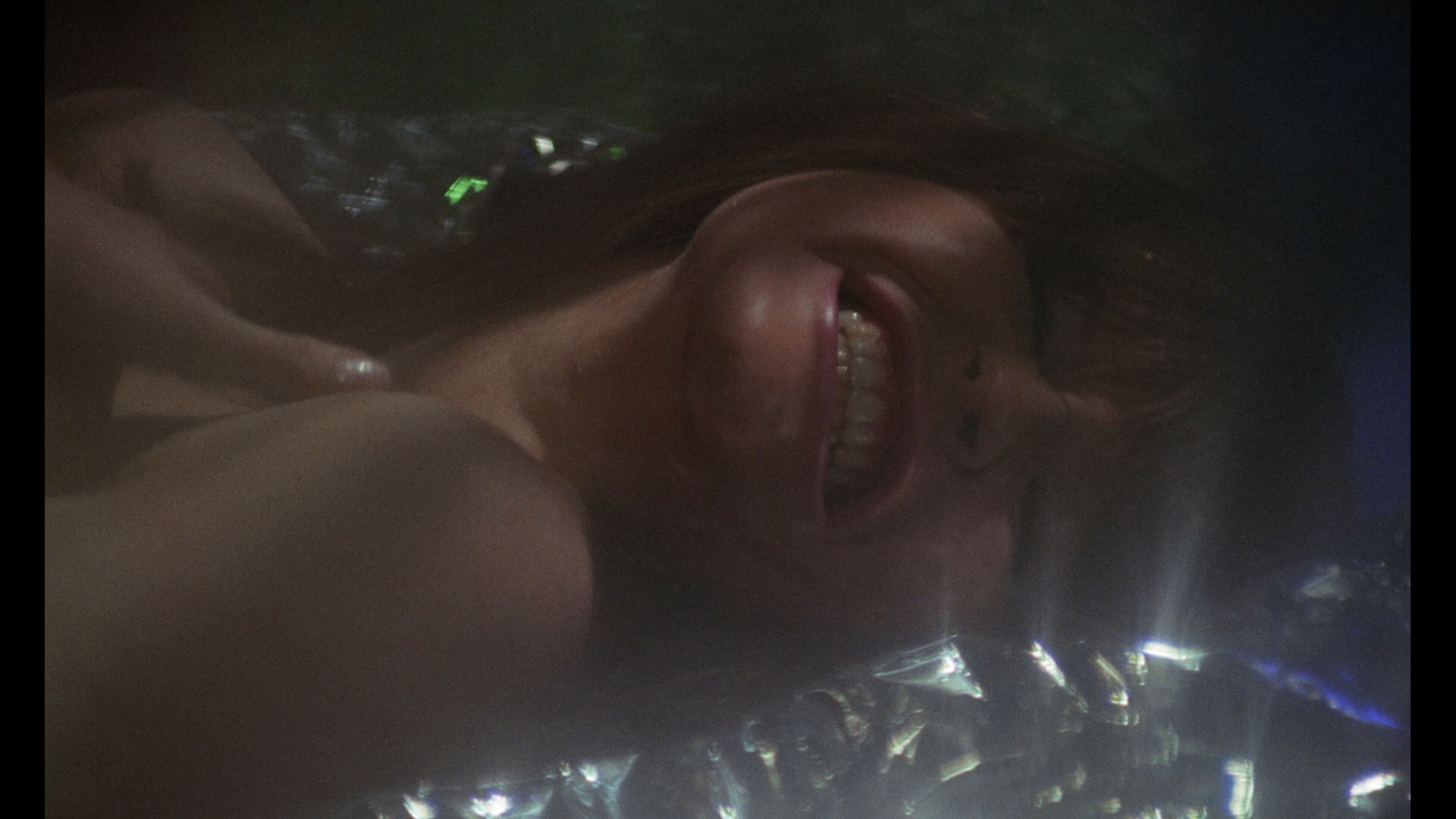 on disc five the set starts to really emphasize the "Curiosities" part of its title with one of the most perplexing projects of Cushing's career: Bloodsuckers, also shown
on disc five the set starts to really emphasize the "Curiosities" part of its title with one of the most perplexing projects of Cushing's career: Bloodsuckers, also shown  as Freedom Seeker and Incense for the Damned. Shot in the U.K., Greece, and Cyprus, this highly troubled production ended up being credited to the nonexistent director "Michael Burrowes" when its actual director, Robert Hartford-Davis (The Black Torment, Corruption, Beware My Brethren), didn't complete the film. Either the production ran out of money during filming or Hartford-Davis became so distracted and involved in the local scene that he lost track of what was happening, depending on the source, but regardless what resulted was a clearly incomplete piece of work that had to be cobbled together in the editing room. The producers also went back and shot a protracted drugs, sex, and murder orgy sequence for racier markets (i.e., France) featuring Jean Rollin icon Françoise Pascal, playing a murder victim in the original footage who looks nothing like her. No matter how you see it, the first half hour or so is an outrageous editorial mess with narration and confusing character intros trying to fill in the gaps of the narrative based on the bestselling novel Doctors Wear Scarlet by Simon Raven. Stick with it though as the film actually does become worthwhile and quite compelling after that, largely due again to its wild cast you can't imagine all congregating for a project this bizarre.
as Freedom Seeker and Incense for the Damned. Shot in the U.K., Greece, and Cyprus, this highly troubled production ended up being credited to the nonexistent director "Michael Burrowes" when its actual director, Robert Hartford-Davis (The Black Torment, Corruption, Beware My Brethren), didn't complete the film. Either the production ran out of money during filming or Hartford-Davis became so distracted and involved in the local scene that he lost track of what was happening, depending on the source, but regardless what resulted was a clearly incomplete piece of work that had to be cobbled together in the editing room. The producers also went back and shot a protracted drugs, sex, and murder orgy sequence for racier markets (i.e., France) featuring Jean Rollin icon Françoise Pascal, playing a murder victim in the original footage who looks nothing like her. No matter how you see it, the first half hour or so is an outrageous editorial mess with narration and confusing character intros trying to fill in the gaps of the narrative based on the bestselling novel Doctors Wear Scarlet by Simon Raven. Stick with it though as the film actually does become worthwhile and quite compelling after that, largely due again to its wild cast you can't imagine all congregating for a project this bizarre. the Filipino film Blood Thirst, a pairing recreated on DVD in 2001 from Something Weird via its distribution through Image Entertainment. That version was taken from an okay 35mm print, with some gray market horror packs throwing this one in and an Australian DVD turning up in 2005 from Umbrella. The first
the Filipino film Blood Thirst, a pairing recreated on DVD in 2001 from Something Weird via its distribution through Image Entertainment. That version was taken from an okay 35mm print, with some gray market horror packs throwing this one in and an Australian DVD turning up in 2005 from Umbrella. The first  truly good-looking release came on Blu-ray in 2022 from French label ESC as part of its "British Terrors" line, framed at 1.66:1 and looking really gorgeous. The original English and surprisingly excellent French dub are included along with a French-language presentation by Nicolas Stanzick (18m49s).
truly good-looking release came on Blu-ray in 2022 from French label ESC as part of its "British Terrors" line, framed at 1.66:1 and looking really gorgeous. The original English and surprisingly excellent French dub are included along with a French-language presentation by Nicolas Stanzick (18m49s). Freedom Seeker title sequence and the U.S. theatrical
Freedom Seeker title sequence and the U.S. theatrical  trailer.
trailer. meta commentary on the horror genre and its contradictory relationship to the nourishing power of love.
meta commentary on the horror genre and its contradictory relationship to the nourishing power of love.  Instead they find that the star is really committing to his vampire bit so much that he might be a real-life bloodsucker, and he's also deeply devoted to his wife, Heloise (Valli). What follows is a macabre dress-up dinner, followed by a feigned suicide, lessons in love, and a twist or two before everyone reaches their unorthodox destinies.
Instead they find that the star is really committing to his vampire bit so much that he might be a real-life bloodsucker, and he's also deeply devoted to his wife, Heloise (Valli). What follows is a macabre dress-up dinner, followed by a feigned suicide, lessons in love, and a twist or two before everyone reaches their unorthodox destinies. The Blu-ray is also an excellent way to experience it for the first time or to revisit if you've only seen the iffy tape copies floating around; the one challenge is choosing a language track, since the disc has both options with equal drawbacks. The English version features Cushing and Valli's original voice performances, and they're both wonderful; their scenes together really only take flight when watched that way. On the other
The Blu-ray is also an excellent way to experience it for the first time or to revisit if you've only seen the iffy tape copies floating around; the one challenge is choosing a language track, since the disc has both options with equal drawbacks. The English version features Cushing and Valli's original voice performances, and they're both wonderful; their scenes together really only take flight when watched that way. On the other  hand, everyone else is very badly dubbed, especially the now nonsensical musical bits. Switching to the French track whenever Cushing and Valli aren't on screen may be the best way to go if you don't mind having your remote in hand throughout, and optional English-translated or English SDH subtitles are provided for the DTS-HD MA 2.0 mono tracks either way. A commentary by Jonathan Rigby and Kevin Lyons is another worthy addition, focusing quite a bit on Cushing understandably and noting how much he loved and supported this film for its sweet central theme. In "Love Me Tender, Dracula" (15m44s), one-shot director Pierre Grunstein explains how the project came about after he had honed his craft working for Claude Berri on several early films with this paving the way for much subsequent work as a producer in French films. His memories here jibe with the tone of the film as he explains how the low budget also meant he and co-writers Justin Lenoir and Hal Brav were really free to let themselves go. In "Menez of Speaking" (21m10s), Menez recalls how his own Berri connection led to this film (with promises of it being a smash hit), as well as his first meeting with Miou-Miou, his enthusiasm working with established international actors, his perplexed reaction to his first full read of the script (which he compares to The Fearless Vampire Killers), and his struggles to come to terms with the tone even after the film was made. A strange (mostly) English trailer as La Grande Trouille is also included.
hand, everyone else is very badly dubbed, especially the now nonsensical musical bits. Switching to the French track whenever Cushing and Valli aren't on screen may be the best way to go if you don't mind having your remote in hand throughout, and optional English-translated or English SDH subtitles are provided for the DTS-HD MA 2.0 mono tracks either way. A commentary by Jonathan Rigby and Kevin Lyons is another worthy addition, focusing quite a bit on Cushing understandably and noting how much he loved and supported this film for its sweet central theme. In "Love Me Tender, Dracula" (15m44s), one-shot director Pierre Grunstein explains how the project came about after he had honed his craft working for Claude Berri on several early films with this paving the way for much subsequent work as a producer in French films. His memories here jibe with the tone of the film as he explains how the low budget also meant he and co-writers Justin Lenoir and Hal Brav were really free to let themselves go. In "Menez of Speaking" (21m10s), Menez recalls how his own Berri connection led to this film (with promises of it being a smash hit), as well as his first meeting with Miou-Miou, his enthusiasm working with established international actors, his perplexed reaction to his first full read of the script (which he compares to The Fearless Vampire Killers), and his struggles to come to terms with the tone even after the film was made. A strange (mostly) English trailer as La Grande Trouille is also included. ![]()